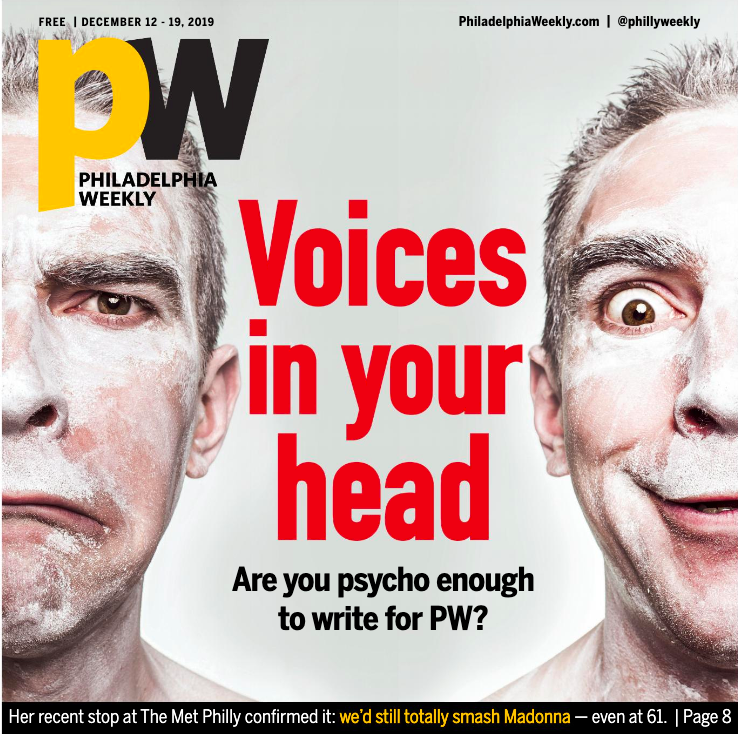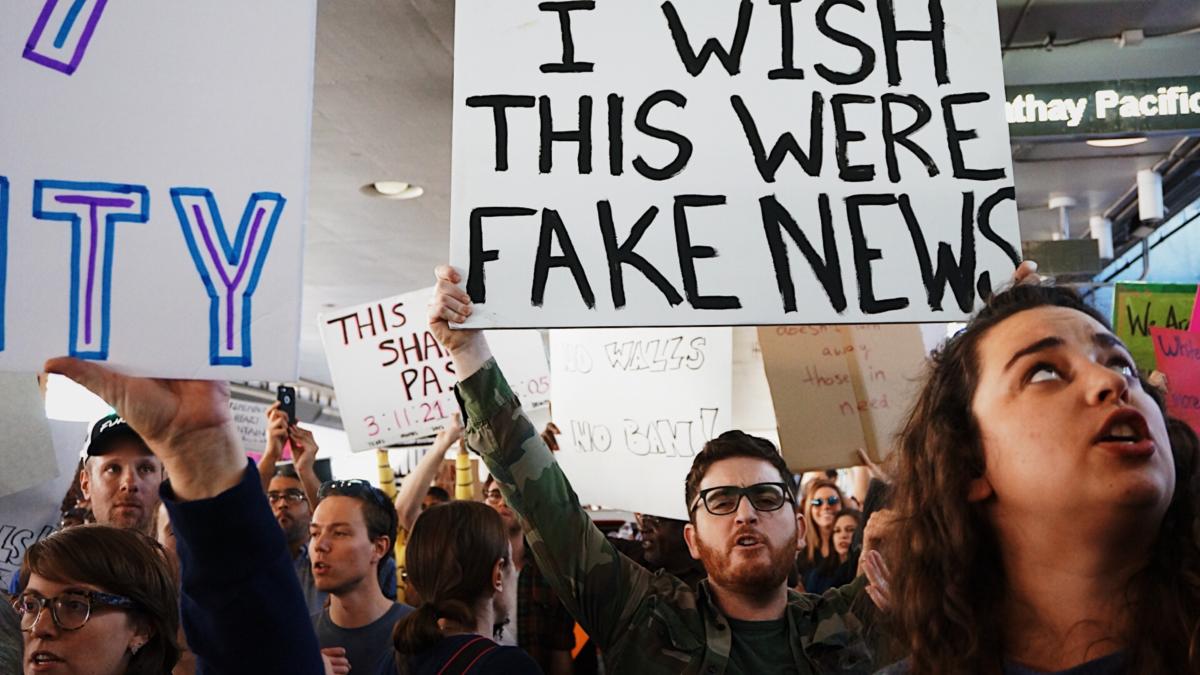The SHOUT Out:
“Fascism is unfolding and in power. This regime must be driven from office NOW and they must be driven out on the basis of repudiating the whole fascist program – from the caging of children to banning Muslims to the shredding of environmental protections to their attacks on LGBTQ people, their threats against the people of the world and so much more.”
— Samantha Goldman, an organizer with Refuse Fascism Philly, prior to the group’s planned protest at last Saturday’s Army-Navy game, in which President Trump attended.
Your turn:
Do you agree with Samantha? Send your thoughts to voices@philadelphiaweekly.com
Brain disease is not a joke
Dear Editor:
As the parent of a child with a serious mental illness, I cannot express how offended I am by your “ad” for a writer. And I can only imagine the hurt felt by those who struggle with mental illness who see this ad! HOW INSENSITIVE – actually disgraceful on your part!
Brain disease is not a joke. Would you feel comfortable joking about cancer, heart disease, or diabetes? Stop joking about illnesses that affect the brain – So wrong!! I think an apology is in order!
Sad and concerned,
— Karen Redmond | Philadelphia

As neighborhoods change, hazards must be a focus
Dear Editor:
There’s no doubt Philly is changing. A century ago, Philadelphia was an industrial powerhouse. That brought prosperity to Philly neighborhoods, but it also meant tremendous pollution. Today, many former industrial sites are being rezoned and redeveloped for residential use. Nowhere is that more apparent than in Kensington and the surrounding communities, where condominiums and apartment buildings with names like “Tie Factory Lofts” and “Frankford Stacks” are a nod to the area’s industrial tradition. Development in these areas is occurring at breakneck speed and radically reshaping neighborhoods.
Developers behind these projects have a legal and moral responsibility to make sure new construction does not expose communities to past environmental threats and air quality hazards. And Philadelphia residents must hold them accountable.
Formerly industrial land often contains significant environmental contaminants like asbestos, lead, volatile organic compounds, solvents and a host of other toxins. Exposure to these contaminants can create serious health issues, including a wide range of respiratory conditions and cancer. Developers must adhere to specific standards in testing the land for these hazards and safely removing contaminated dirt and materials from the site.
Unfortunately, developers eager to meet construction deadlines cut corners, withhold information and even mislead regulators on the extent of environmental hazards on specific projects. At Clean Air Council, we’ve seen this occur time and time again. Environmental testing results are never shared with the city, or contaminated dirt is not disposed of properly. Some developers are all too willing to put profit before the health of the very residents they’re hoping to attract.
But the problem is deeper than that.
In Kensington and surrounding communities, this construction is also affecting residents already living there – many have lived in the area for generations. These neighborhoods already have some of the greatest health challenges in the city – from some of the highest rates of childhood asthma to some of the shortest life expectancies.
Throughout the city, these hazards often disproportionately affect people of color. Non-Hispanic black and Hispanic children suffer asthma-related hospitalizations at a rate five to six times higher than that of non-Hispanic white children, according to Philadelphia’s Health of the City 2018 report.
As development changes these communities, we must make public health a priority. Residents can report construction dust, illegal burning, demolitions and other potential hazards to the city at:
It falls on developers to do the right thing and make sure construction projects don’t jeopardize public health. It falls on the city, neighbors and concerned citizens to keep them honest and guarantee the development does not put future or current residents at risk.
Joseph Otis Minott, Esq. is the executive director and chief counsel of Clean Air Council.
— Joseph Otis Minott, Esq. | Philadelphia
Dangerous fee hikes for immigrants in the works
Dear Editor:
Vulnerable immigrant communities are under attack.
The Trump administration has proposed policies that will slap a series of fees on Philadelphia’s immigrants and then will use the revenue generated from these fees to fund the detainment and deportation system currently striking fear in communities of immigrants across the country.
Immigrant populations throughout the United States are being dealt a harsh blow by the United States Citizenship and Immigration Services through a regressive tax on immigrants, refugees, and asylees. The proposed fee schedule would exorbitantly raise the required fees that immigrants must submit to the U.S. government to file for various forms of immigration relief. It would eliminate fee waivers for naturalization purposes, raise naturalization fees by 83 percent, and establish new fees for asylum applications.
Ultimately, this administration is prioritizing enforcement over integration in the same way that our government has prioritized incarceration over education for citizens. It is another example of a wrong-headed policy that creates more problems than it solves.
The policy is also a blatant attempt to wrest power from minorities by affirmatively preventing low-income immigrants from naturalizing and being able to vote. These fee increases and the proposed elimination of fee waivers have real consequences for Philadelphia’s immigrants like the clients our team at HIAS Pennsylvania serves every day.
For instance, one of the extremely vulnerable Ethiopian asylees we serve arrived in the United States after fleeing the Ethiopian Civil War. He was granted asylum in 2011 and received his green card four years later. After arriving in the U.S., he was diagnosed with diabetes and placed on dialysis.
Because he is unable to work and has no family to support him, he relies on Supplemental Security Income to pay his rent. However, due to a rule that requires legal permanent residents to naturalize within seven years of arrival to continue accessing SSI benefits, his SSI was recently cut off and he will need to naturalize to regain his primary source of income. While under the current policy he would receive a fee waiver to cover the costs of applying for citizenship, the proposed rule change would preclude him from receiving the waiver and require he pay $1,170, almost two full months of SSI payments.
Due to his low income and health issues, he risks homelessness.
The largest fee increase is for victims of crime, or someone who obtained their legal status by cooperating with law enforcement in the investigation of a crime committed against him or her. Crime victims who seek to bring over qualifying family members have to pay 559 percent more, $1,515, to ask for permission to get the family support that they may desperately need in the wake of a crime. Imagine being trafficked at a young age – 14 or 15, drugged and prostituted by a violent American criminal for months or even years, escaping, cooperating with police to bring criminals to justice, and then, in an attempt to start your life over as an adult, seeking to bring a sister, brother, or other beloved family member here to help you heal, and being told that all that you suffered, all your reliving of the trauma that you suffered to bring the criminal to justice, was not sufficient. This proposed rule would also introduce a $50 asylum application fee. USCIS claims the fee would “alleviate the pressure” on the backlog of asylum applications, thereby leaving USCIS employees more time and resources to perform other immigration duties. However, many people fleeing extreme situations in their home countries and seeking asylum in the United States do not have $50 to spare.
Two important proposed fee hikes also require immigrants to pay to get their day in court – the application for suspension of deportation or special rule cancellation of removal (increasing by 216 percent) and the request for a hearing on a decision in naturalization proceedings (increasing by 151 percent).
In other words, if an immigrant feels they had an unfair hearing, they would have to pay an exorbitant sum to appeal. This proposed fee hike could have deadly consequences. Don’t let the fear win. The public has until Dec. 30 to submit comments about the proposed rule change. All are encouraged to submit a unique comment via the USCIS website.
For more information about the rules and about how to write a comment visit the Catholic Legal Immigration Network website . If you wish to avoid having your name and identifying information become part of the public record, you may submit comments anonymously.
Cathryn Miller-Wilson is executive director of HIAS Pennsylvania.
— Cathryn Miller-Wilson | Philadelphia

THE WEEK IN TWEETS
Last week, our call for writers of a counterculture nature went completely off the hinges.
While we received a ton of great pitches as a result (thank you), some believed to garner those responses, we poked fun at mental illness. We see it differently, but we hear you. Here’s a few of those responses…
Make Christmas wonderful for child in need
Dear Editor:
For many children, the Christmas season is “the most wonderful time of the year.” Many children are taking part in fun holiday traditions: picking out the perfect Christmas tree, visiting Santa, and spending time with family and friends.
But, for more than 5,000 Philadelphia kids in foster care, Christmas looks very different. What most of them want more than trees, Santa and parties is a family. They want a place where they feel they belong, a safe place where they can play, dream, and grow.
In my work as the executive director of an organization that supports children and families with social services, I see kids like these every day. And it’s hard to celebrate this season with my own family without thinking of them and wondering if they know how much they matter.
Right now, more than 125,000 children across the United States are waiting for adoptive families. That is enough children to nearly fill Citizens Bank Park and Lincoln Financial Field combined. Children in foster care need families who will love them and provide them with stability. But every year, roughly 20,000 teens in foster care will “age out” without a family to call their own. Between today and the time your family wakes up on Christmas morning, nearly 800 youth will have to leave the foster care system alone.
Children who leave foster care without an adoptive family often face challenges like homelessness, poverty, incarceration, and substance use disorder, continuing a vicious cycle of trauma in our city and around the country. As a community, we must step into these hard places. We must be proactive and find ways to prevent this cycle of trauma.
Even in this season of joy, many children enter foster care because their parents are experiencing difficult situations.
A dad struggling with addiction should know that he can achieve his sobriety in rehab while his children are safe and loved, without having to watch them go into foster care.
The Safe Families for Children program is a national movement for parents who are facing heartbreaking situations like these. It’s designed to keep families together, allowing parents to work through difficult situations, while host families temporarily care for their children anywhere from a few days to several months. During this time, parents stay highly involved in their kids’ lives.
Through Safe Families for Children, we are seeing families stay together and gain new support networks right in their community. When a child goes into foster care, they typically spend two years there. But children hosted through Safe Families typically return home in just 45 days. With foster care, only around 50 percent of children are reunified with their families. But with Safe Families, 93 percent of children are able to return home.
The Safe Families for Children program empowers parents to get back on their feet faster, keeps families together, and keeps children from enduring additional losses and trauma. We’ve seen this program work when the community rises to meet the needs of its most vulnerable. There are so many ways to get involved, whether it’s by hosting a child, supporting host families with meals, transportation, or babysitting, or by mentoring a child.
Consider making this holiday season the most wonderful time of the year for a family in need.
Heather Bert is executive director for Bethany Christian Services of the Greater Delaware Valley.
– Heather Bert | Philadelphia





